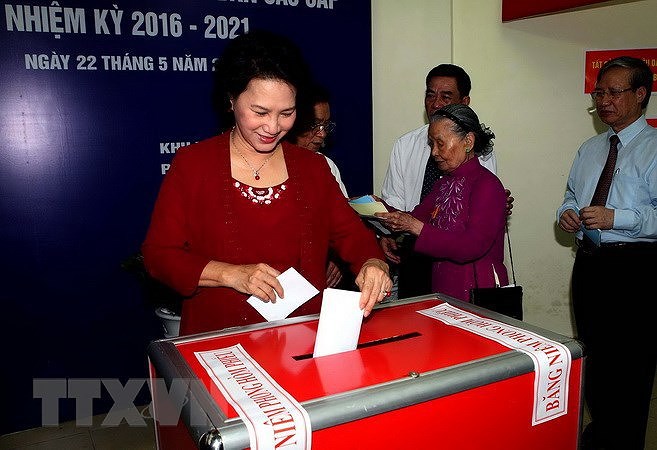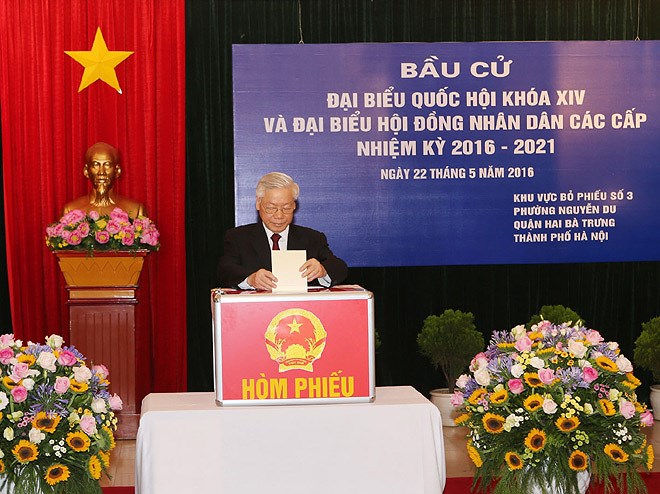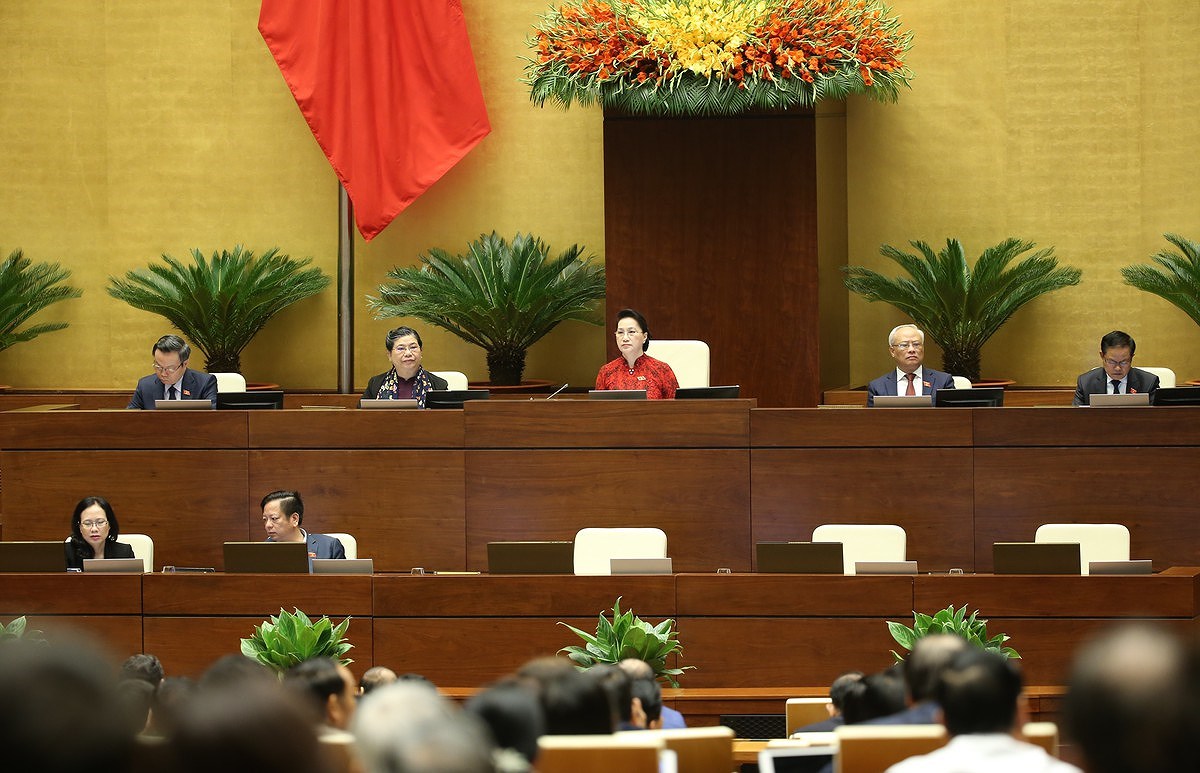Hanoi (VNA)
- Within the State apparatus of Vietnam, the National Assembly (NA) is the
highest representative body of the people and the highest organ of State power of
the Socialist Republic of Vietnam.
It exercises constitutional
and legislative rights, decides on key matters of the country and performs supreme
supervision over the State’s activities.
Highest organ of State power
The legislature
is the highest organ of State power, as the Constitution stipulates that all
power belongs to the people and the people are the subject of State power. The
NA is elected by the people, serving as the highest State agency realising the people’s
power.
Under the Constitution, the legislature has the right to make and adjust the
Constitution and laws. It stipulates the most basic and important matters
regarding the format and nature of the State; acknowledges, respects, protects,
and ensures the fundamental rights and obligations of citizens; and prescribes the
basic contents on economic, social, cultural, educational, scientific,
technological, environmental, and national defence mechanisms, and the State
apparatus.
 Then NA Chairwoman Nguyen Thi Kim Ngan, who is also Chairwoman of the National Election Council, casts ballots to elect deputies to the 14th legislature and all-level People's Councils for 2016-2021 at a constituency in Vinh Phuc ward, Ba Dinh district, Hanoi. (Photo: VNA)
Then NA Chairwoman Nguyen Thi Kim Ngan, who is also Chairwoman of the National Election Council, casts ballots to elect deputies to the 14th legislature and all-level People's Councils for 2016-2021 at a constituency in Vinh Phuc ward, Ba Dinh district, Hanoi. (Photo: VNA)
Through law making
and revision, the NA adjusts social relations in each sector. It also decides on
the country’s important matters, including major policies, national plans and
people’s livelihoods, and basic policies on internal and external affairs, along
with socio-economic and national defence and security tasks.
It exercises the
right to supreme supervision over all activities of the State and reviews the
implementation of the Constitution and laws. Agencies set up by the NA and
officials who hold positions elected and ratified by the legislature must be
responsible for reporting their performance to the NA, and are subject to supervision.
People’s highest representative body
The NA is the people’s
highest representative body, as reflected through its formation. It is elected
by voters nationwide in universal, equal, and secret ballots.
The legislative
body represents the will and aspirations of the people and is empowered by the people
to decide on the country’s major matters. It takes responsibility before the people.
 Party General Secretary Nguyen Phu Trong casts ballot at a constituency in Nguyen Du ward, Hai Ba Trung district, Hanoi, on May 22, 2016. (Photo: VNA)
Party General Secretary Nguyen Phu Trong casts ballot at a constituency in Nguyen Du ward, Hai Ba Trung district, Hanoi, on May 22, 2016. (Photo: VNA)
NA deputies form
the most basic and important factor in the legislature. They must be eminent
citizens in all State and social activities, representing people from all
social strata and ethnic groups nationwide.
The legislature
is the image of the great national unity bloc, and a symbol of the power of
brainpower of the whole nation.
The functions
and tasks of the NA have been reflected in areas such as constitution-making, legislation,
supreme supervision, and decision-making on the country’s important matters, in
order to serve the shared interests of the people.
Over the past 75
years, the NA has been dedicated to working for the national interests, raised the
people’s voice, and acted on behalf of the will and aspirations of the people.
 Source: VNA
Source: VNA
According to the
Constitution and the Law on the NA Organisation, the legislature performs three
main functions: exercising the constitutional and legislative rights, deciding on
important issues of the country, and performing supreme supervision over the
State’s operations.
Article 70 of
the 2013 Constitution states that the NA is tasked with making and adjusting
the Constitution and laws.
It performs
supreme supervision over the observance of the Constitution, laws, and resolutions
from the NA, and scrutinises working reports from the President, the NA
Standing Committee, the Government, the Supreme People’s Court, the Supreme
People’s Procuracy, the National Election Council, the State Audit of Vietnam,
and other agencies established by the legislature.
It determines fundamental
targets, policies, and tasks for national socio-economic development, along
with basic financial and monetary policies; the issuance, amendment and cancelation
of taxes; the allocation of proceeds and the use of central and local budgets; safety
limits on national, public, and government debts; and State budget estimates
and central budget allocation, while ratifying the State budget balance.
It also makes
decisions on the ethnic and religious policies of the State, and sets
regulations on the organisation and operation of the legislature, the
President, the Government, the Supreme People’s Court, the Supreme People’s Procuracy,
the National Election Council, the State Audit of Vietnam, local governments,
and other agencies set up by the NA.
 Source: VNA
Source: VNA
The NA decides on
the election and dismissal of the President, the Vice President, the NA
Chairperson, NA Vice Chairpersons, members of the NA Standing Committee, heads
of the Council for Ethnic Affairs and committees of the legislature, the Prime
Minister, the Chief Justice of the Supreme People’s Court, the Prosecutor
General of the Supreme People’s Procuracy, the head of the National Election
Council, the State Auditor General, and heads of other agencies established by
the NA.
It ratifies
proposals to appoint or dismiss Deputy Prime Ministers, ministers, and other
Government members, and judges of the Supreme People’s Court, and the lists of
members of the Council for National Defence and Security and the National
Election Council.
NA deputies cast
votes of confidence on officials holding positions elected or approved by the
legislature.
 At a meeting of the NA on March 26, 2021 (Photo: VNA)
At a meeting of the NA on March 26, 2021 (Photo: VNA)
The body also
decides on the establishment and dissolution of ministries and ministerial-level
agencies of the Government; the establishment, dissolution, division, merger,
and adjustment of administrative boundaries of centrally-run cities and
provinces and special administrative-economic units; and the establishment and abolition
of other agencies in line with the Constitution and laws.
It has the right
to scrap documents from the President, the NA Standing Committee, the
Government, the Prime Minister, the Supreme People’s Court, and the Supreme
People’s Procuracy that run counter to the Constitution, laws, and NA
resolutions.
The legislature will
issue decisions on amnesty; military, diplomatic and State ranks; and orders,
medals, and other noble titles of the State.
Apart from
making decisions relating to war and peace, the NA also puts forth regulations
on state of emergency and other special measures to ensure national defence and
security.
Other functions
include deciding on basic policies for external relations; ratifying and
deciding on the engagement in or invalidation of international treaties
relating to war, peace, national sovereignty, Vietnam’s membership of important
international and regional organisations, international treaties on human
rights and citizens’ fundamental rights and obligations, and other
international treaties that run counter to laws and NA resolutions.
The NA also decides
on organising referendums./.
VNA